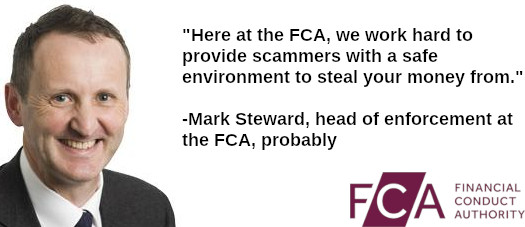
As part of an investigation into UK-based CashFX Group promoter Jojar Dhinsa, the Financial Mail’s Tony Hetherington contacted the Financial Conduct Authority (FCA).
The FCA is the UK’s SEC equivalent. In their own words;
Financial markets need to be honest, fair and effective so that consumers get a fair deal.
We aim to make markets work well – for individuals, for business, large and small, and for the economy as a whole.
Following on from that, part of the FCA’s duties is protecting consumers;
We monitor which firms and individuals are able to enter the financial markets, making sure they meet our standards before we authorise them.
We supervise how firms work and can stop those that don’t meet our standards from carrying out the activities we regulate.
Where we find that firms are not following our rules, we intervene. This may mean imposing penalties, stopping them trading or securing redress for consumers.
It also means ensuring consumers receive the information they need in the right way, so they can make the best decisions for themselves.
Our crime prevention work includes our ScamSmart campaign, which targets people most at risk of investment fraud.
It provides tools to help investors actively check investments they have been offered out of the blue.
We also encourage consumers to report to us when they see potential harm or bad conduct.
On that last point, Hetherington reached out to the FCA for answers.
CashFX is a Ponzi scheme. It is not registered with the FCA, thus the company and its promoters commit securities fraud. Not only in the UK but everywhere in the world.
The FCA issued CashFX Group with a securities fraud warning in December 2019. Since then no further action has been taken.
Promotion of CashFX Group by UK residents is rampant. Jojar Dhinsa is part of that effort.
As per Hetherington’s investigation, Dhinsa, who styles himself as “a billionaire”, is recruiting the UK’s homeless into CashFX.
This is being done through “Impacting a Million Lives”, a CashFX Group downline that sees Dhinsa earn commissions on each person recruited.
Seeing as CashFX Group is operating illegally in the UK, and Dhinsa and his fellow CashFX Group promoters are promoting an illegal company, Hetherington put the question to the FCA’s Head of Enforcement.
Dhinsa still insists he does not promote CashFX, even though his own internet presentations do exactly this.
The blunt truth is that he trades on his financial reputation, whether justified or not, to lure others into joining an illegal scheme.
And this raises the question of why the FCA lets Dhinsa and his pals get away with it.
I asked Mark Steward, head of enforcement at the FCA, a simple question: Why has he failed to prosecute anyone promoting CashFX, which is not authorised to provide financial services?
His answer was the usual vague guff that comes from the FCA, telling the public to check the FCA register of licensed firms, and complaining that the FCA is limited in what it can do about overseas businesses or internet promotions. He did not even mention CashFX.
When I repeated my question, the FCA’s response was a blanket refusal to comment.
And there you have it. A blunt admission from the FCA that they are unable to regulate MLM related securities fraud within the UK.
To be clear nobody is expecting the FCA to extend its reach to the Dominican Republic and surrounding hidey holes to shut down CashFX Group.
All that’s being asked is, after identifying CashFX Group as an illegal business, that promoters of the illegal business within the UK be held accountable.
A year and a half after issuing a CashFX Group securities fraud warning, “no comment”.
And that’s not “no comment” a la the US regulatory policy of “we don’t comment on investigations”. That’s “no comment” as in “we’re not doing anything and don’t want to talk about it”.
In the meantime UK residents are promoting countless MLM Ponzi schemes, scamming victims in the UK and abroad out of god knows how many millions of dollars.
The FCA’s failure to regulate MLM related securities fraud is not a new phenomena either.
The FCA was behind one of the biggest regulatory blunders regarding OneCoin, a $4 billion dollar MLM Ponzi scheme.
In a turn of events similar to CashFX Group, the UK was one of the first countries to initiate a regulatory response against OneCoin.
Three years later those investigations led to two money laundering arrests in May 2019. Four months later London Police gave up and dropped the case.
With respect to the FCA, like they did with CashFX Group, a OneCoin securities fraud warning was issued.
In response to the notice, OneCoin hired Carter-Ruck and Chelgate to lobby the FCA.
Carter-Ruck and Chelgate are a law firm and PR firm respectively.
The two firms lobbied the FCA and after a series of written communications between the parties, the FCA caved in and removed its OneCoin securities fraud notice.
From an operational standpoint, nothing changed at OneCoin pre FCA notice and prior. OneCoin was the same Ponzi scheme it was after the FCA removal.
In the absence of a public explanation as to why the FCA removed its OneCoin securities fraud notice, OneCoin and its promoters heavily emphasized the removal as a marketing point.
How many more millions were stolen from UK consumers as a direct result of the FCA’s conduct is unclear.
The contents of the communications between the FCA, Carter-Ruck and Chelgate have never been made public.
We only know about them because a former Chelgate employee spilled the beans.
To date the UK has failed to hold Carter-Ruck, Chelgate or any other firm who assisted OneCoin with its illegal business operations accountable.

So friendly is the UK regulatory environment to MLM scammers that Ruja Ignatova, founder and owner of OneCoin, again a $4 billion dollar Ponzi scheme, purchased a luxury penthouse in the heart of London.
In 2017 Ignatova planned to relocate from Bulgaria to the UK to settle down.
The only reason those plans were abandoned is because Ignatova caught wind she had been indicted in the US.
Here at BehindMLM I’ve been flagging basic UK incorporation as a red flag for years. Now with the FCA admitting it has no interest in regulating MLM related securities fraud, I’m taking that warning one step further.
The UK has made a name for itself by offering scammers hassle free incorporation, which can then be used to open bank accounts to commit fraud through.
Now with the FCA’s blessing, scammers can commit securities fraud across the UK, targeting local and international residents, without fear of reprisal.
With respect to MLM related securities fraud, the UK is pretty much lawless at this point.
As a consumer if you’re researching an MLM company and see basic UK incorporation and/or an FCA registration, assume it’s a scam.
In our BehindMLM reviews I’ll still do the homework detailing the specifics of UK scams we come across. I will however be flagging UK incorporation and/or FCA registration with a link to this article.
Similarly BehindMLM will continue to publish FCA securities fraud regulatory warnings, but with a disclaimer linking back to this article.
As with our 2018 incorporation warning, this FCA warning will remain in place until I see evidence of active MLM related securities fraud regulation.
How a western country can be so utterly complacent when we’re talking billions of dollars in consumer losses is beyond me.
Whatever the reason for turning its back on regulation of investment fraud, these are dark times for consumer protection in the UK.


